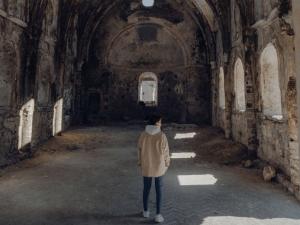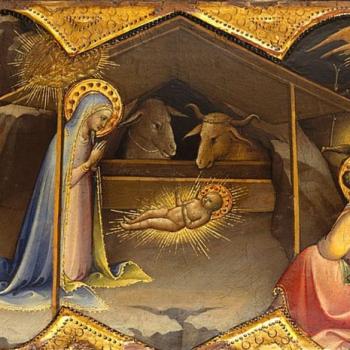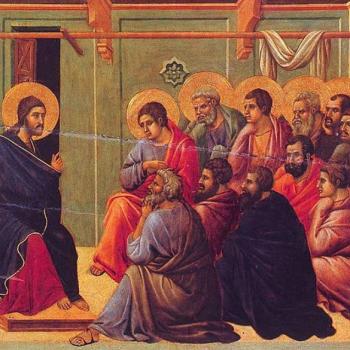Hello Patheos! My name is Jon, and this column is about what to do after religious deconstruction.
In my early twenties, my childhood Christian faith collapsed.
This does not make me special in any way. Millions of church-raised millennials are taking our spiritualities apart. For better or worse, the deconstruction movement is growing and gaining speed. Doubt is cool. There is money to be made pointing out Christianity’s flaws and failures.
Older Christians tend to dismiss deconstruction as the complaints of their entitled children. They miss a crucial point. Some church-raised people are actively deconstructing their faith. But for most of us, deconstruction comes upon us unsolicited.
What Is Deconstruction?
John D. Caputo writes that “deconstruction isn’t something that we do to things; deconstruction happens” (What Would Jesus Deconstruct, 16).
Deconstruction happens when the meaning that we make out of a story or text meets the truth. Faced with truth that does not fit our meaning, we are forced to rethink our understanding.
Jacques Derrida coined the term “deconstruction.” He believed that deconstruction is inevitable. Sooner or later, we become aware of the weaknesses and inconsistencies in our understanding. This is how deconstruction works for church-raised Christians.
We received a tight system of beliefs about God, morality, the Bible, the family, the church, the nation, the world, and the future. We were told that these beliefs would save us from suffering and the judgment of God. We were told that questioning these beliefs will undo their spell.
But life does not cooperate. Truth meets the Christian story as it was constructed for us, and the Christian story is not up to the challenge. Most of us don’t set out to deconstruct our faith. Deconstruction happens to us, and more than a few of us wish that it had not.
My Story
There were many factors that undermined my faith. The most personal is that as a young pastor, I was diagnosed with Crohn’s Disease. That is not what I was promised. God is supposed to guide and protect his servants, but faithful service of God did not protect me from a debilitating autoimmune disorder.
I was forced to face the truth of my mortality and existential helplessness. I suffered long bouts of severe pain and weakness. My childhood religion had little to say about my suffering. The Christians around me weren’t much help, either. If my faith couldn’t help me with my most difficult experiences, what good was it?
Crohn’s Disease was the catalyst for my deconstruction, but I had other issues. Science always made sense to me. I could never buy into the literal, young earth, six-day creation theory. In seminary the historical criticism of Scripture destroyed any illusion that the Bible is a history book as we think of it. In my Christian history classes, the failures of my spiritual ancestors often brought me to tears.
Worst of all was the example of so many of my fellow Christians. We are proudly anti-intellectual. Our institutions cover up the abuse of vulnerable people. We viciously defend ourselves from criticism. We use the Bible as a weapon and try to force our morality onto the world. We judge and exclude anyone who is different. We have united our faith with money, power, and politics in ways that would make the Old Testament prophets spontaneously combust.
There is a huge gap between the New Testament promises and the lives we actually live. “Love, joy, peace, patience, kindness, gentleness, and self-control” (Galatians 5:22) hardly describe most of the Christians I have known. And as sanctimonious as I would like to get about the failures of others, my own branches are devoid of the Spirit’s fruit more often than not.
After careful review of the evidence, any reasonable person would be forgiven for concluding that Christianity is a good story, but ultimately a fairy tale.
That is where I landed after deconstruction. It was awkward. My faith fell apart while I was a working pastor with people to shepherd. All my higher education is in religious studies, and I had no idea what to do next.
I could not unsee what I had seen. I could not undo deconstruction and return to my original, naive faith. I had to be true to my experience. But when my philosophical wrecking ball finally came to rest, I also had to admit that my soul was not satisfied.
In the Ruins
I was surrounded by the ruins of a system that no longer made sense to me. But so many of the disconnected pieces were still essential to my identity as a person.
My mind still burned with existential questions. I still believed in right and wrong, good and evil, and moral responsibility. I still believed in the image-of-God dignity of every human being. I still believed that the meaning of life is found somewhere in truth and love. I still believed in spirit and soul.
I deconstructed my religion, but my spiritual ache did not go away. The truth was like a fire that burned up every untenable belief. But the beliefs that were left were sharper and brighter than ever before.

On To Reconstruction
It took a while and I resisted, but eventually I had to admit that I am a spiritual person. Spirituality is central to my identity, whether I like it or not. I also had to admit that I would never find my way to a better spirituality through deconstruction. Endlessly rehearsing the flaws and failures of Christianity as a whole was not good for me. It certainly made no positive difference in the world.
This is where my process of reconstruction began.
Over the next several years I dug into the neurology and psychology of religion. I looked into the dusty corners of Christian history for other ways of approaching the faith. I practiced new (to me) forms of spiritual discipline.
But most of all, I became fascinated with Jesus. I still had all my old doubts about the historicity of the Bible. I was still frustrated by the yawning abyss between Christian belief and our lived reality. But the life, teaching, work, example, death, and resurrection of Jesus captivated me.
With Jesus as the cornerstone, I rebuilt my faith. Not for my church. Not for my family. Not out of a sense of obligation or duty or guilt or false hope. I rebuilt my religion for me, because it was right for me and because Jesus has my heart.
Here’s what I’ve learned: Religious deconstruction happens. It’s usually not your fault. But healthy spirituality is possible after deconstruction.
I did not return to my childhood faith. The things that bother me about Christianity still bother me. I still have my questions, doubts, and objections to Christian thinking. But my faith is more alive and meaningful to me than ever.
This column is about reconstruction. Join me each week as I share my story of rebuilding my religion.
Thanks for reading! You can also check me out on YouTube here.













